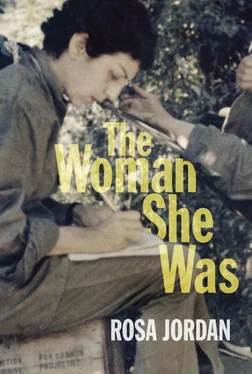Celia listened with a smile and never asked for details. Thus there was a several-month delay in hearing a tidbit of gossip that did interest her. One day at the hospital Esther Cohen popped in, and in her abrupt way asked, “Which of those Lago brothers are you seeing, Celia?”
Celia looked up from her desk, surprised by the question. “Neither one. Why?”
“Oh yes, you know—the one who calls here all the time. Or used to.”
“Oh. Used to.” Celia wondered what had prompted the question, as it had been months since Luis had telephoned her at the hospital. “That was Luis, the older one.”
“The one who recently got married?”
“Yes. I grew up down the street from the Lagos. I didn’t know you knew them.”
“Slightly,” Esther said airily. “I met the younger one at services.”
“Services? You mean church?” Celia must have looked dumbstruck.
“Synagogue.” Esther gave Celia her competitive, one-up smile and was gone.
The exchange so intrigued Celia that she could not resist asking Liliana, “Do you know if José is seeing a doctor from my hospital?”
“Oh yeah!” Liliana brightened at the opportunity to demonstrate more in-the-knowness about her playboy tío. “Doctora Cohen. Emily told me. One day Tío Luis couldn’t pick her up after church so he asked Tío Joe to do it. Emily said she was crossing the street to where he was parked when Doctora Cohen came out of her synagogue and Tío Joe whistled at her. Emily said Doctora Cohen stopped and looked him and the máquina over in this really bold way. He called out did she want to go to lunch with him, and what do you suppose she said?”
“I cannot imagine,” Celia admitted because she really could not.
“Doctora Cohen said, ‘That depends on how good a conversationalist you are, and whether you have anything interesting in mind for later.’”
Celia chuckled at the very thought of comedy/dramas likely to be played out between those two as they clicked and clashed. “Is he still seeing her?”
“Her and about twenty other women. I guess he’s pretty good to all of them, though, because he does get a lot of repeats.”
“I am sure he is,” Celia said and kept to herself the rest of that thought, which was: As long as he gets a lot of high-energy, low-hassle sex geared to his bio-rhythms rather than those of his partner and no questions as to whom he bedded the night before.
According to Liliana, much of José’s time in Miami was spent fighting with his ex-wife, trying to get permission from the court to take his daughters on vacation out of the country. Knowing how Alma ached to know her grandchildren, Celia hoped he would find a way to bring them to Cuba—preferably not one of the illegal ways that Liliana said he often threatened when he returned from Miami in a really foul mood.
“Sad,” Celia mused. “Given half a chance I think José would be a good father.”
Liliana, who was sprawled on the sofa with a textbook propped on her chest, said casually, “He told me that if you moved to Miami and married him, he might be able to get custody of his kids. At least part of the time.”
“Oh really?” Celia sat down in the rocker and looked at her niece speculatively. “And you would have two little sisters. Was that what you wanted?”
“I wouldn’t mind. But it doesn’t matter so much now.”
“It mattered before?”
“Well, yeah. Before he started letting me drive the convertible.”
In a voice that carried a hint of disgust, Celia asked, “Is that what he promised you if we moved to Miami? A car?”
Liliana reddened and did not answer. All Celia could think was, A car! She was willing to abandon Cuba and me for a car!
After a moment Liliana sat up and, textbook clutched to her chest, said with a mixture of apology and defiance, “The car wasn’t the main thing. I just wanted to see what it was like over there. You know, like people used to.”
For a second Celia failed to comprehend “like people used to” since not in her lifetime had it been possible to hop over to Florida for a mere look around. Then she grasped that Liliana didn’t mean the recent past but the whole of Cuban history—or almost all of it. Five hundred years during which residents on both sides of the Strait travelled both ways for business, vacations, family visits, or just to get a sense of what it was like “over there.”
“You never wanted to travel so you don’t understand how I feel,” Liliana stated with the assurance of an adolescent that no adult can possibly comprehend their passion.
Celia almost smiled. If only you knew, she thought. I travel to places so far in the past that the only way to get there is in my head. And similarly transported, there’s hardly a night in the last year that I haven’t travelled into the mountains to be with a man who finds all his meaning there… and only come back because what I have to do is here.
“There is Operacíon Milagro,” Celia ventured.
“Do you think it’ll still be going on when I get out of medical school?”
“Almost certainly. Maybe even expanding by then.”
“I saw a list of the countries where doctors are being sent,” Liliana said thoughtfully. “I wouldn’t care which one as long as it was, well, some where.”
Celia had a sudden image of Dr. Leyva’s daughter, whose desire to go “somewhere” had led to her death and a lifetime of sadness for her family. It was followed by an enormous sense of relief that a travel option had opened up for Liliana—or would be open if she pursued her education.
Celia crossed a leg over her knee to expose the sole of her foot. “So, Doctora Liliana. What do you think? Are my feet healed enough to go to the beach?”
Liliana studied the scared sole. “Not barefoot,” she pronounced. “And not alone. I have to go with you.” She pushed the book aside. “I’m burnt out on studying anyway.”
“What are you reading?”
“ La Historia de la Revolución . It is so boring.” As she headed into her room to change, she added, “Except for the part when they were in the sierra.”
Celia dressed for the beach and waited for Liliana. She came out pulling up her swimsuit. “When I’m living in Santiago, could we visit the Comandancia de La Plata sometime?”
“Funny. I was just wondering if that was something you might like to do.” Actually, Celia had thought of it more than once when they were doing their “every weekend a different place.” She had never suggested it, though, being not quite ready to share it—or Miguel—with anyone.
“I wish the book had more about Celia Sánchez.”
“She was a very private person. Only Fidel really knew her.”
“Magdalena says even though he has Dalia now and all those sons, he still goes to Celia’s place late at night and sits there for hours because he misses her so much.” Liliana turned her back so Celia could tie the strap at the neck. “You think it’s true?”
“Possibly. Lift your hair out of the way.”
“I wonder if I’ll ever meet a guy who loves me that much,” Liliana mused, her bright dark eyes going dreamy. “Lots of women risked their lives for him. And that was when he was still a grungy revolutionary. But Celia was his true love, wasn’t she?”
“So they say,” Celia murmured.
“Imagine living with one man—how long?”
“Well, it was in 1957 that she went to stay with him in the mountains, and January 1980 when she died. Twenty-two years, I guess.”
“Awesome! There must be a million women in the world who would like to sleep with him. Even now, when he’s a dottery old man.”
“Not so dottery,” Celia protested.
“Would you ?” Liliana challenged, smirking over her shoulder.
Читать дальше












